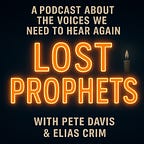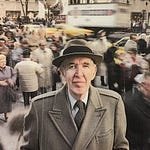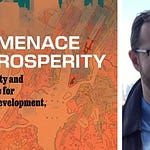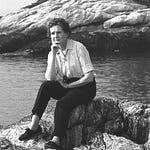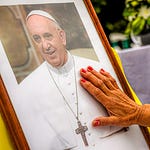
“Devout and Dangerous” is the title—irony intended—of an excellent documentary film about the life and times of Fr. Daniel Berrigan, his brother Philip, and their circle of Catholic activists for peace.
The priest brothers were indeed publicly devout in their antiwar actions but “dangerous”? Certainly FBI director J. Edgar Hoover was convinced of the great harm the group posed to his reputation and to that of his unaccountable agency.
In reality, during the years of the Vietnam War and afterward for two decades, what these militantly nonviolent activists “endangered” was the continuing, mostly unquestioned operations of the U.S. military-industrial complex, whether in the offices of local draft boards or in the weapons plants manufacturing nuclear warheads.
If only recently, a Jesuit pope was speaking to the world about the need to finally discard doctrines of “just war” in favor of the philosophy and practice of nonviolence, the witness of Dan Berrigan and his circle of fellow resisters spoke prophetically of these things over a half century ago.
As the anguish around the Vietnam War grew to a white heat in the 1960s, American Catholics were just getting comfortable with their arrival in middle-class society, symbolized by the Kennedy election at the beginning of the decade. Nothing could have been more shocking than the spectacle of a Catholic priest being arrested and going to jail for an act of civil disobedience (at a massive antiwar protest at the Pentagon). Such a thing had simply never happened before. (Actually it had, when Daniel’s brother, Father Philip Berrigan, was first arrested for a civil rights demonstration in 1962.)
Nor were any Americans prepared to read of two priests and several laypeople entering a draft board center in Catonsville MD, taking out draft records to cover with blood, and then burning with homemade napalm in a parking lot before joining hands in prayer as they awaited arrest.
Were these useless, symbolic efforts? The Berrigans’ actions inspired over 200 draft board raids before the Vietnam war ended, and convinced Daniel Ellsberg to copy and disseminate the 7,000 pages of the Pentagon Papers. Numerous voices later attributed a major role to the Berrigans in turning world public opinion against the war. But even if that didn’t happen, Berrigan wouldn’t have seen his work as a failure: “ Good work is its own justification,” he would say. “The outcome is in other hands besides ours.”
Dan Berrigan published over 50 books of essays, poetry and theology, and was nominated numerous times for the Nobel Peace Prize, notably for his work in Northern Ireland during the Troubles.
Our guest for this episode, Fr. John Dear, was a close collaborator with Dan Berrigan for several decades. He is an internationally known author, activist and teacher of peace and nonviolence. He has been nominated for the Nobel Peace Prize by Archbishop Desmond Tutu, Senator Barbara Mikulski, and several others.
Some key takeaways from our conversation:
Daniel Berrigan’s gift for creating memorable language about justice. As he and his fellow resisters stood burning draft files at Catonsville, Maryland in 1967, Berrigan famously said to the small crowd (and to the world), “Our apologies, good friends, for the fracture of good order, for the burning of paper instead of children, for the angering of the orderlies in in the front parlor of the charnel house. We could not, so help us God, do otherwise.”
He moved away from some aspects of his Jesuit culture but he never failed to acknowledge what his training gave him: a deep sense of God in the world, and most especially in the human community.
His faithfulness to the Word of Scripture as liberation: “We go to this Word in fear and trembling, knowing that the World itself is a judgement, a two-edged sword, as Paul declares.”
His wonderful ability to perform, to act, to transform prosaic events into theater and poetry, as in the case of his Broadway play, The Trial of the Catonsville Nine
His humor (usually with a point): “Don’t just do something, stand there”, he liked to say. (A way of making the point that most “doing something” is less valuable than taking a stand for something.)
He came to believe and teach that the nonviolent way of life should be the normal way for a human being to live, something that in fact neither of his great inspirations—Gandhi and Martin Luther King Jr.—had ever quite said.
As for our motivations, he taught: “Do the good because it’s good; speak the truth because it’s the truth. Don’t worry about your influence or the outcome—leave it to God, it’s in better hands than ours.”
Berrigan was once asked, “How many times have you been arrested?” He replied, “Apparently not enough.”
Timestamps:
(0:00) Intro discussion
(6:00) Childhood and early years as a priest, experiences in Europe, first writings, founding of Catholic Peace Fellowship, exile to Mexico
(20:00) Travels in Latin America, returns to the U.S. (Cornell U.)
(23:30) Hanoi trip, the Catonsville MD draft card burning, repercussions and reactions, trial of the Catonsville Nine
(38:30) Goes underground, arrested and imprisoned
(49:30) New activism around nuclear weapons, just war theory, nonviolence, friendship and book with Thich Nhat Hanh
(52:30) Peace action at G.E. plant in King of Prussia PA, trial and later film about the trial
(59:30) Acts in The Mission movie, teaching, writing, final interview
(1:06:00) Interview with Father John Dear
(2:01:30) Final reflections
Recommended:
Daniel Berrigan, Essential Writings, ed. by John Dear (2009)
At Play in the Lion’s Den, biography of Berrigan by a good friend and collaborator, Jim Forest (2017)
No Bars to Manhood, Daniel Berrigan (2007)
Disarmed And Dangerous: The Radical Life And Times Of Daniel And Philip Berrigan, Brothers In Religious Faith And Civil Disobedience, Murray Polner, Jim O’Grady (1998)
In the King of Prussia, Emile de Antonio’s filmed re-enactment of the Plowshares trial, 1982 (YouTube)
The Holy Outlaw, 1970 doc film by Lee Lockwood for NET.
Bare Ruined Choirs: Doubt, Prophecy, and Radical Religion, Gary Wills (1972)


